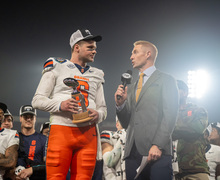Roos Weers deals with dyslexia, transition to U.S. in becoming star at Syracuse
Logan Reidsma | Photo Editor
Roos Weers has emerged as one of the best options on Syracuse's front line in her first season.
As Rob Weers drove his rental Kia Sorento through Syracuse, he turned to the passenger seat and asked his daughter which direction to turn for J.S. Coyne Stadium.
It had become a familiar conversation through the years, first while biking to primary school in the Netherlands.
“She said to go to the left and she meant the right,” Rob said. “She is dyslexic … so it’s difficult to distinguish for her. Left and right are abstract; (they) don’t say anything.”
Eventually the Weers family arrived and Roos had two goals and two assists in a 9-1 win later that day.
It’s been a season of successes for Weers — who leads No. 1, undefeated Syracuse in goals, game-winning goals and is tied for most assists — especially considering she was going to attend Albany until a chance encounter with SU midfielder Alma Fenne at a friend’s birthday party in the Netherlands.
The transition to American field hockey has been a challenge, but it’s one Weers wanted. She expected to learn English, but didn’t know the jargon of the sport she’d played all her life – the one her father thought she’d never learn – would change.
“It was pretty embarrassing in the beginning,” Weers said. “(At practice, my teammates) said, ‘Right, Roos,’ and I’d say, ‘I’m on my way,’ but be going the wrong way.”
Weers grew up hearing “forehand” instead of “right” and “backhand” instead of “left” on the pitch about 500 meters from the family’s house. Holding the stick helped her visualize the directions and made dealing with dyslexia easier.
Her mother, Janneke Rutten, a schoolteacher who also has dyslexia, recognized the signs around when Weers was five years old. Weers struggled to read and write words and repeated her mistakes, sometimes 10 times consecutively. It took her twice or three times as long as others to learn the same material and she never read in groups.
“It’s difficult because sometimes it’s really annoying and embarrassing,” Weers said. “… You have to accept it. You can’t do anything about it. The only thing you can do is work harder. That’s what I’ve done all my life.”
When Rob, a field hockey coach, and her brother, Bram Weers, a star player who’d eventually play on one of the world’s top clubs, went to the pitch, Roos went too.
Rob describes Bram as a natural talent who didn’t need much instruction and could do anything with the ball.
“Then Roos started. Complete different story,” he said, laughing. “I explained things to her and she’d always do the opposite … I said to her mother, ‘I think she’s never going to learn it.’”
Weers joined a team and trained four times per week. In her free time, Weers copied Bram and they played games. They practiced one of field hockey’s most difficult skills, the drag flick. It requires wrist action which many American girls aren’t strong enough for, Rob said. Roos stood at the 25-yard line and Bram stood about 20 yards behind her. They practiced flicking, competing to see who could most consistently reach the baseline.
At 14, Roos joined Bram’s club, Kampong, and played there for five years. By the time she reached juniors at 17, the club asked Roos to play Saturdays in the younger tournaments and Sundays for the seniors.
“She puts a lot of effort in … People with a lot of talent have it easier,” Rob said. “(Bram) doesn’t get all out of his skills, and Roos does.”
Weers wanted to travel and learn foreign languages, but she had a difficult time learning Dutch itself. She decided she needed immersion, playing for clubs in Barcelona and Manchester. After her year abroad, Weers returned to Amsterdam, where she met Fenne.
Before Fenne and Weers moved to Syracuse, became South Campus roommates and the top two scorers for the Orange, they ran into one another at a friend’s birthday party in the Netherlands and started talking about America.
Fenne thought she was going to Boston College, but “they blew me off,” she said. Weers mentioned she’d been talking to Albany for three months because her friend, Fiori Van Rijswijk, went there.
“Well, I’m not sure if they’re good enough, like if I would learn a lot,” Weers said.
“Oh my God, dude. You have to come to Syracuse,” Fenne said.
As soon as Weers arrived, she struggled. Not just with the lefts and rights; she also hadn’t finished her paperwork, couldn’t travel to away scrimmages and failed her first 2,000-meter run test.
English presented a challenge, but a welcome one. She’s learning tenses. Sometimes she says, “I did saw,” instead of “I saw,” but she’s practicing. She also finds comfort in her South Campus apartment, where she cooks Dutch pancakes and speaks Dutch with Fenne, friends over FaceTime and her parents.
But which language Weers is speaking doesn’t matter; she’s usually talking about one thing.
“She debates in field hockey over everything,” Fenne said. “Sometimes it’s really fun debating in Dutch … Sometimes it’s like, ‘OK, Roos. No field hockey today. We practice for four hours.’”
When Rob came to Syracuse and the three went to Chili’s, Fenne saw it was a family attribute. Rob peppered dinner conversation with questions about the team’s press defense.
Earlier that day, Rob had watched practice. There he saw his daughter, the one who left him exasperated many years ago on the pitch near home, as one of the best players on America’s No. 1 field hockey team.
“Every time, I’m surprised,” Rob said. “… When she was eight, I thought, ‘Ohhhh. We’re never going to make it.’
“But we did.”
Published on October 21, 2015 at 7:55 pm
Contact Sam: sjfortie@syr.edu | @Sam4TR





